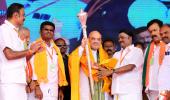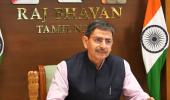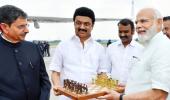When it comes to electoral politics, religion has taken a back seat in Tamil Nadu long before Hindutva became fashionable in its various avatars, observes N Sathiya Moorthy.

Addressing a religious function in Chennai the other day, Tamil Nadu's controversial Governor R N Ravi declared that 'Sanatana Dharma is so inclusive that it does not leave anyone. Distortions came up during foreign invasion and a large section of people tend to forget our origin.'
While he is entitled to his views and may also be getting platforms to air his views, for his Bharatiya Janata Party masters at the Centre to non-Sanghi and anti-Sanghi states like Tamil Nadu, they are mistaken.
Independent of other interpretations, by and large, such discourses, especially coming from the Constitutionally-mandated governor, only serves the opposite cause.
As a term, Sanatana Dharma was not in vogue in Tamil Nadu until very recently, only when the likes of Ravi started using the term in reference to Hinduism.
Even state BJP leaders in the past, or even at present, have refrained from using such 'archaic terms'.
With the result, in certain circles that are even otherwise opposed to the socio-political ideology of the ruling BJP at the Centre, even Sanatana Dharma has come to be equated with 'hardcore' Hindutva of the north Indian kind.
They may not flinch from projecting Sanatana Dharma as the one that contributes to continued religious tensions and violence elsewhere in the country, which includes lynching as in Uttar Pradesh and Rajasthan, and the targeted killing of the Gauri Lankesh kind in neighbouring Karnataka, not very long ago.
More than what Ravi left unsaid, it is what he said that has greater potential to open old wounds.
Statements like 'Distortions came up during foreign invasions' is contradictory to what the Dravidian social ideology has been arguing for a hundred years, if not more.
That the likes of what Ravi and others call the 'Dharma Shastras', say, for instance, the Manu Smriti with its delineation of 'Varnashrama Dharma', or vocation-based castes, is at the bottom of the Indian social structure from time immemorial -- long before 'foreign invasions' began a thousand years back.
In short, Ravi is talking about 'religious invasion' that commenced with the advent of Islamic rulers from across the Khyber Pass, followed by the Christian East India companies of the Dutch, French and the most successful English.
However, Dravidian ideologues are fed on a substantial, if not overdose, of the much earlier theory of cross-Khyber 'Aryan-Brahmin invasion' of the Dravidian land (which to them covered the whole of India as the 'Indus Valley civilisation' stands testimony to).
That there is no substantial evidence to this argument does not matter to them -- as it is all about 'belief', as it has been to the other side on other issues.
But unacknowledged by their ideological rivals, starting with Hindutva-NRIs in the West, there has been an equal measure of pan-Tamil cultural counter-attacks on social media, mostly in Tamil. It emanates mostly from within the state and the rest of the country.
There have also been social media posts of the kind from wherever 'Tamils from India live', starting earlier with the Gulf-Arab region, and lately, the US, too.
Now, when commentators and defenders of Sanatana Dharma in the state going back in history, the Dravidian stream is far more ahead, even there -- or, so it seems.
According to this school, it is no more 'Dravidian Indus Valley', as used to be the argument.
They have been citing recent excavations in Keezhadi and elsewhere in the state, which according to American-researched carbon-dating puts the age of urban civilisation in these parts -- hence also in the rest of the country -- at 6th century BCE, or twice the age of the Indus Valley Civilisation.
In a loaded statement while addressing a pan-Tamil organisation (mainly of Sri Lankan Tamils) in North America on Zoom, Chief Minister M K Stalin made the point that Tamil Nadu is 'initiating studies to fill the gaps in understanding the history of the Indian subcontinent'.
Needless to say that Stalin has been raising the pitch on pan-Tamil identity and ideology in a way calibrated to match or outsmart the high-pitch Hindutva campaign by the likes of Ravi and a select few from the state BJP.
It also means that with funding for pan-Tamil archaeological studies, and for permanent exhibitions in various excavation sites, the incumbent government seems intent on keeping the issues alive and kicking -- even when they are out of power.
Suffice to point out that at the height of the pan-Tamil Jallikattu protests in 2017, a lot of dust got kicked up when an impression was created that the Archaeological Survey of India was shutting down the Keezhadi excavations, based on past principles in the matter.
Thus, even when a Hindutva-supportive government is in power, it may now become difficult to cut funding or deny the importance of some of these projects, kickstarted or expanded by the Stalin dispensation now.

Then, there is Ravi's reference to Sri Sankara, Ramanuja, Madhvacharya and Aurabindo as beacons of the Sanatana Rashtra, which he implied Tamil Nadu, too, otherwise was/is.
Of the four, for the first three are acknowledged as the champions of the Bhakti movement for Hindu revivalism after centuries-long 'onslaught' by Buddhism and Jainism across the country.
Among the three, Ramanujar (1017-1137 CE, or 120 years) belonged to Tamil Nadu, and is known as much for being the first enunciator and practitioner of 'social justice' of the perceived Dravidian variety -- as for his 'non-dualist' philosophy of Visishtadvaita.
He was the pioneer in mass conversion of untouchables, not just as 'caste Hindus', as the anachronistic terminology goes, but as Vaishnavite-Brahmins, too, as he himself was an ardent devotee of Lord Vishnu.
So much so, the late Dravidian ideologue and former DMK chief minister M Karunanidhi, in the closing years of his life, penned a Tamil tele-serial after him. It was well received even by his ideological opponents and socio-political critics.
Yet, that was only an one-off affair for them, not to acknowledge his political creed as they had once done way back in 1967, against the incumbent Congress government.
So have they kept his CM-son Stalin's politics from his wife Durga Stalin's religiosity, which is no more a closet affair, as used to be in the early decades of their marriage.
But what is of greater import in context is what Governor Ravi has left unsaid on most such occasions.
That relates to the role and contributions of Tamil Saivite poet-savants in Hindu revivalism in the time-period when Sankara, Ramanuja and Madhvacharya lived.
To date, it is the works of Saivite and Vaishnavite saint-poets in the spread of Saivism and Vaishnavism that have caused the deep-rooted spread and acceptance of Hinduism in the state.
Until possibly when Prime Minister Narendra Modi had 20 Saivite Adheenams from southern Tamil Nadu hand over the Sengol or traditional sceptre to him at the inauguration of the new Parliament complex on May 28, 2023, much of north India had not heard of the role of these mutts.
Whether they also got to know about the Tamil-based Bhakti movement is another matter altogether.
Yet, when it comes to electoral politics, religion has taken a back seat in the state long before Hindutva became fashionable in its various avatars, since the birth of the parent Jan Sangh in the early sixties.
So much so, when caste is an acknowledged factor in electoral politics in the state, religion is not so much.
This has been so even during the days of the late 'Periyar' E V Ramaswami Naicker, but for which pro-god, pro-Hindu Brahmins would not have voted in large numbers for the DMK-led alliance in 1967, though at the instance of C Rajagopalachari, then leading the Swatantra Party.
Today, Periyar's 'Black Shirts' movement has been replaced a hundred thousand-fold and more by the attire by the same colour worn by pilgrims to the hill shrine of Lord Ayyappa in Kerala, year after year.
Their numbers are only swelling, but politics and elections in Tamil Nadu remain uninfluenced.
Worse still, with each passing generation, the Dravidian Black Shirts are dwindling in numbers and very visibly so.
It is a dichotomy that Hindutva ideologues in the state and BJP strategists in 'distant Delhi' have not understood, or acknowledged, or both.
According to some BJP veterans, whom incumbent state party leader K Annamalai has purposefully sidelined, while it may be necessary to press the ideology up to a point, and even 'politically exploit situations' as created by the 'Meenakshipuram conversions' (1981) in the then unified district of Tirunelveli, followed by the violent 'Mandaicaud clashes' in southern-most Kanyakumari district a year later.
State BJP veterans too attribute this lack of understanding on the part of Governor Ravi and such others in the national party hierarchy for their overall thinking that in the ongoing Senthil Balaji case has given the ruling DMK an undue political advantage that was not theirs to begin with.
According to them, there was an overwhelming under-current of support for his arrest by the Enforcement Directorate, including within the ruling DMK, where he was seen as a 'Johnny come lately' from the rival AIADMK.
His arrest and possible lead-up to others higher in the party and government hierarchy and outside is what BJP sympathisers and other anti-DMK segments had hoped for, as if it were a fait accompli, a natural follow through.
But it was not to be.
By repeatedly interfering with the 'due process' and acting in a manner that he might not have been able to sustain if taken up before a court of law, Governor Ravi may have spoilt the political broth already.
For, alongside social sentiments attaching to core Dravidian/pan-Tamil politics, there is also an unmistakable undercurrent of federal principles that travel alongside for no clear reason.
While his speeches have put local BJP supporters on the defensive in matters of religion and social justice, his add-on 'attack on the Constitutional scheme' in the Senthil Balaji case, has been condemned squarely by many legal experts and editorial writers across the country, thus adding weight to Stalin's position -- at least until the courts come up with their binding views.

Yet, the game is not yet over for Governor Ravi.
In retracting his unilateral order dismissing Senthil Balaji from the Stalin cabinet without the chief minister's advice or consent, he has clearly stated that it owed to Union Home Minister Amit A Shah's (post facto?) advice for him to confer with the attorney general (on the Constitutional position).
The governor has clarified that he has only kept the dismissal order in abeyance, pending consultations with the attorney general.
And for those (possibly within the Hindutva structure, both in the state and elsewhere, too, who may think that he retracted his order on the face of all-round condemnation from 'anti-BJP, anti-Modi' political parties, leaders and individuals, he has simply served the ball to Amit Shah's court.
'Knock at his door, not mine', seems to be his message. It also implies that he may not have been done with the Senthil Balaji issue, at least as yet.
And for Amit Shah and the Centre, it is not a now-or-never game.
Having prioritised Maharashtra affairs over Tamil Nadu, they may take their time returning their attention to the state, possibly having been taken aback by Senthil Balaji's wife Megala challenging the ED's arrest of her husband, that too on procedural grounds -- which similarly-placed anti-BJP parties had overlooked all along.
Feature Presentation: Aslam Hunani/Rediff.com
N Sathiya Moorthy, veteran journalist and author, is a Chennai-based policy analyst & political commentator.










